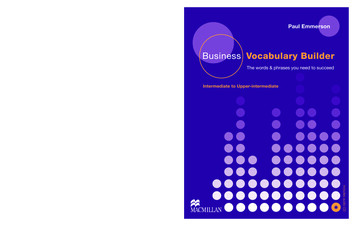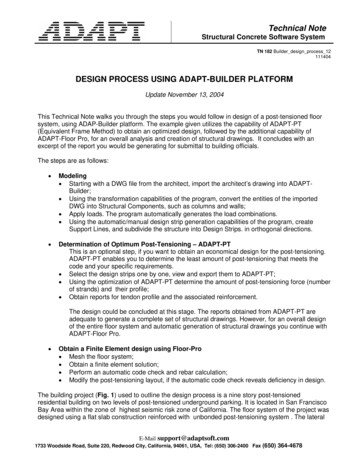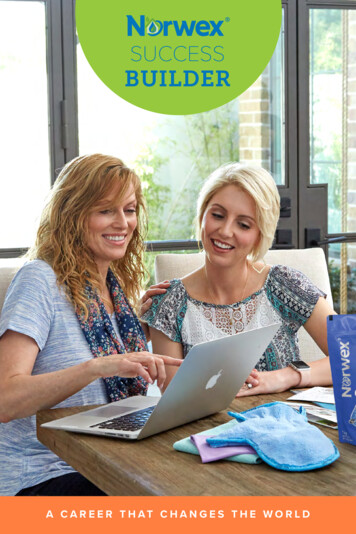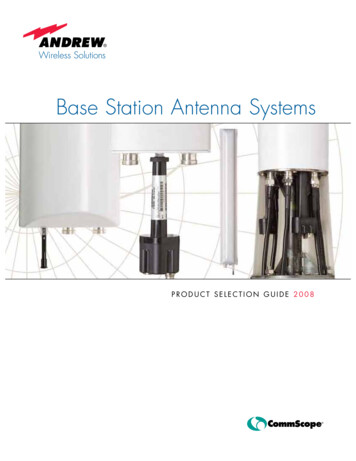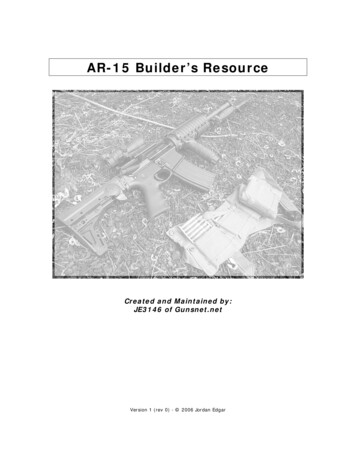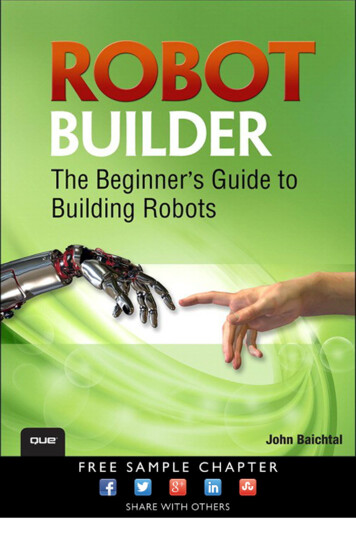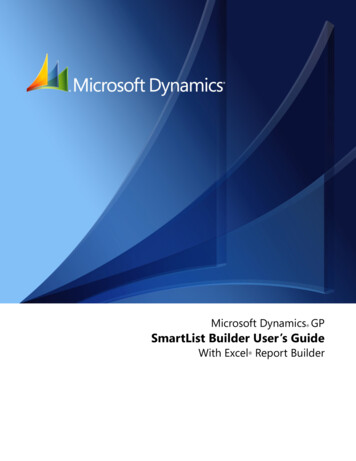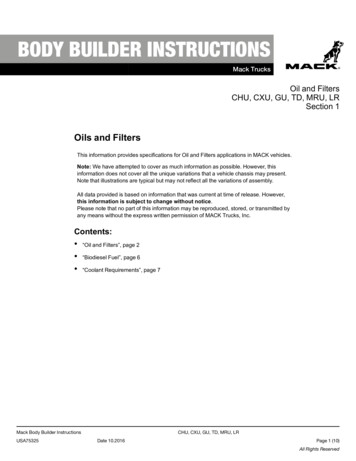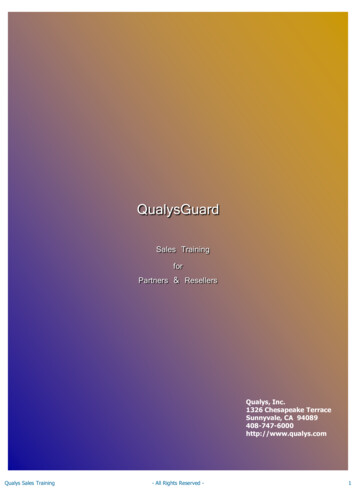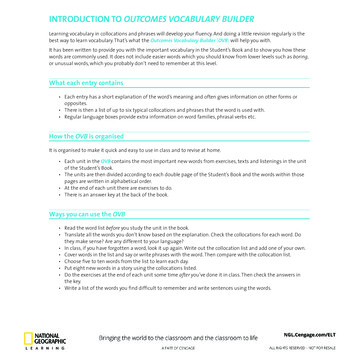
Transcription
INTRODUCTION TO OUTCOMES VOCABULARY BUILDERLearning vocabulary in collocations and phrases will develop your fluency. And doing a little revision regularly is thebest way to learn vocabulary. That’s what the Outcomes Vocabulary Builder (OVB) will help you with.It has been written to provide you with the important vocabulary in the Student’s Book and to show you how thesewords are commonly used. It does not include easier words which you should know from lower levels such as boring,or unusual words, which you probably don’t need to remember at this level.What each entry contains Each entry has a short explanation of the word’s meaning and often gives information on other forms oropposites. There is then a list of up to six typical collocations and phrases that the word is used with. Regular language boxes provide extra information on word families, phrasal verbs etc.How the OVB is organisedIt is organised to make it quick and easy to use in class and to revise at home. Each unit in the OVB contains the most important new words from exercises, texts and listenings in the unitof the Student’s Book. The units are then divided according to each double page of the Student’s Book and the words within thosepages are written in alphabetical order. At the end of each unit there are exercises to do. There is an answer key at the back of the book.Ways you can use the OVB Read the word list before you study the unit in the book. Translate all the words you don’t know based on the explanation. Check the collocations for each word. Dothey make sense? Are any different to your language? In class, if you have forgotten a word, look it up again. Write out the collocation list and add one of your own. Cover words in the list and say or write phrases with the word. Then compare with the collocation list. Choose five to ten words from the list to learn each day. Put eight new words in a story using the collocations listed. Do the exercises at the end of each unit some time after you’ve done it in class. Then check the answers inthe key. Write a list of the words you find difficult to remember and write sentences using the words.
1seat a seat is the place where you sit: come in andtake a (sit down) / I’d prefer a window (a seatnext to the window) / the next to me / the best in the theatre / you can book s in advance / thefront of a cartop the top person or thing is the highest, mostimportant or best: a head teacher (one of thebest) / she’s the UK’s athlete / score marks inthe exam (very high marks) / he’s in the class (theclass with the highest level) / they live on the floor (the highest floor in a building)Pages 10-11MY FIRST CLASSPages 8-9abroad when you go abroad, you go to a different orforeign country: I’d love to live / she travels alot / go for a holiday / study accent an accent is the way you say words. You cantell where someone is from because of theiraccent: she speaks with an American / a strongFrench (very noticeable) / a slight (not verynoticeable)involve when a job or a course involves something, itincludes it as an essential part: the job s talkingto people and solving their problems / it s a lot ofhard work / it s computer programmingmanagement management is the way of controllingand organizing an organization. The managementis also the group of people who control anorganization. The verb is manage: he’s studyingbusiness / she works in / the company has good / improve of the organization / she managesthe whole hotelmile one mile is 1.6 kilometres. Miles is often used tomean a long way: the town is 500 s from Moscow/ the hotel is only a down the road / a tiny villagethat’s s from anywhere (not near any towns) / it’s s to the nearest shop (a very long way)remind to remind someone about something meansto make them remember it. Be careful – youcannot use remember with this meaning: shereminded me about my doctor’s appointment /can you me to phone home? / he s me of mybrother (he looks like my brother) / that song sme of my wedding (it makes me think about mywedding)rude if something you say or do is rude, it is not politeand might upset people: it’s to ask people theirage / I’m sorry – I didn’t mean to be / how ! /a very man / he knows all the words!available if something is available, you can get it orbuy it. The noun is availability: they want to makelanguage learning more to students / the gameis in the shops now (you can buy it) / her booksare widely (you can get them in lots of differentplaces) / they’re for free / I’m always to helpyou (I can help you) / What’s your availability for ameeting next week?bilingual if you are bilingual, you speak twolanguages very fluently. You can also be trilingual(able to speak three languages) or multilingual(able to speak many languages): I’m in Englishand Turkish / grow up / go to a school / betotally / be almost continuity if there is continuity, things continue in asimilar way without changes or problems: therewas good between teachers / we always try andmaintain / it’s important not to lose / we hadsix different teachers, so there was a lack of deal with if you deal with something, you do whatis necessary. If you deal with a problem, you solveit: her job is to complaints / he has to lots ofdifferent people in his job / have to some difficultcustomers / a difficult problem to defend if you defend something, you say you thinkit is good when other people say it is bad: a lot ofpeople criticized the proposals, but he ed them / hetried to what she had said / he should stand upand himself (say that his ideas are right)disaster if something is a disaster, it is a completefailure: the policy was a / the party was a total /the evening was a bit of a dub if you dub a film, you change the speakingin it from one language into another. Theadjective is dubbed: do you like watching foreignTV programmes that are bed into your ownlanguage? / it’s been bed into Englishenvironment an environment is the place orconditions you live in or work in. Note that whenwe talk about the environment we mean thenatural world: the school provides a good to learnin / it’s a safe to play in / a good working / theylearn better in a good learning 2 OUTCOMES27969 01 Units1-4 p001-017.indd 210/14/09 1:36:49 AM
evidence facts that show if something is true, orshow if someone is guilty or innocent of a crime:the police are still collecting / there’s no againsthim / there’s no to suggest it’s truefluent if you are fluent, you speak a language easily,without making mistakes. The adverb is fluently.The noun is fluency: a English speaker / I’m inSpanish / you write very fluently / I need to improvemy fluencyget by if you get by, you can do something quitewell, but not very well: I’m not very good at French,but I can just about / I don’t know much aboutcomputers – but I / he gets by at school – but he’snot very academichead the head of a country, organization ordepartment is the leader or manager. To headsomething means to lead it or be in charge ofit: he’s the teacher (the leader of a school) / thequeen is the of state / the of the company / he’s ing the negotiationsimprove if you improve, you get better and if youimprove something, you make it better. The noun isimprovement: my English is really improving / to your language learning / the economy is improving /he was very ill, but he’s slowly improving (becominghealthy again) / the government needs to publictransport / there has been a big improvement inyour workkeep if you keep doing something, you continue to doit or do it many times: practising until you can doit / trying / he s phoning me / I forgetting tosend that email / he s telling me I’m wronglack if there is a lack of something , it is missing. Ifyou lack something, you do not have any: therewas a of evidence / the idea failed because of a of interest (people weren’t interested in it) / a of effort (not trying hard enough) / the country smoney to improve education / he completely stalentmaintain if you maintain something, you make itcontinue. If you maintain a building, you keep it ingood condition: I can a conversation in French / a good relationship with my neighbours / we try to high standards / they haven’t ed the house verywell (they haven’t kept it in good condition) / itcosts a lot to the school (to keep the buildings ingood condition)motivation your motivation is the reason whyyou do something. The verb is motivate. If youmotivate someone, you give them motivation:he has no to study / some students fail becauseof a lack of / I lost all my to go running duringthe winter / their teacher really knows how tomotivate thempick up if you pick up a language or some otherskill, you learn it by seeing it or doing it, withoutstudying it in a classroom: I picked up a few wordsof Turkish when I was staying there / they haven’tstudied it at school but just picked it up off thestreet (by playing outside with other young people)/ she picks up languages very easily / I showed himhow to do it and he picked it up very quicklypoint the point of something is the reason to do it:what’s the of studying for exams? / there’s no speaking to him (it will not achieve anything) / the of coming here is to learn English / I don’t see the of spending a lot of money on clothespolicy a policy is an idea or plan that a governmentor organization follows: what is the government’s on education? / health / it’s against company to employ people under 16 / they want thegovernment to change its on immigrationprogress if you progress, you get better at doingsomething. Progress is also a noun: students atdifferent speeds / to slowly / to quickly / he’sdefinitely ing / she’s made huge this term (shehas got much better)provide if you provide something, you give it topeople or make it available: I’ll all the food anddrink / coffee will be d in the break / they should people with more information / this will you witha great opportunityquestion if you question something, you say that youhave doubts about it and think it might be wrong:they ed the prime minister’s decision / somepeople are ing the government’s change in policy/ he was ed by the police (the police asked himquestions) / she ed his motives (wondered why hewas really doing something)range when there is a range of things, there are anumber of different kinds of thing: we discusseda of topics / deal with a wide of levels / thecompany provides a of services / see our full of productsrely on if you rely on something, you need it andtrust it. The adjective for someone you can trust isreliable. The opposite is unreliable: she has to herparents for money (she needs her parents to giveher money) / they everyone else to speak English(they need everyone else to speak English) /you can’t him (you can’t trust him) / it’s a veryreliable train service (you can trust it) / he’s totallyunreliable (you can’t trust him)reply if you reply to someone, you give them ananswer. Reply is also a noun: he replied in English /she didn’t to my letter / sorry for the delay in ing / I still haven’t received a from him / I askedhim a question, but he gave no (he didn’t sayanything)report a report is a written document or a TV orradio programme that gives information abouta subject. Report is also a verb: the governmenthas published a new on the war / according to arecent / the main conclusions of the / a TV on crime / they will back to us next week (theywill tell us the information they have learnt)VOCABULARY BUILDER 327969 01 Units1-4 p001-017.indd 310/14/09 1:36:50 AM
review if you review an idea or a policy, you thinkabout it again and decide what you should do.Review is also a noun: the government is going to its drug policy / we will the situation next week /a of language policyskills your skills are the abilities you have: she’s gotgood language / have computer / management / learn new / he’s got poor people (he doesn’tget on well with people)teach yourself if you teach yourself something,you learn it from books or by practising yourself,without a teacher: is it possible to English? / hetaught himself the guitar / I taught myself howto cooktrade trade is the business of buying and sellingthings. Trade is also a verb: the company does a lotof with China / they are worried they will lose / they want to increase with Europe / improvethe tourist (the business of making money byencouraging tourists to visit an area) / they withcompanies all over the worldPages 12-13bang if you bang something, you hit it. Bang is alsoa noun: I was ing on the door for ages / to thetable hard / I ed my knee on the side of the table(by accident) / I heard a at the door (the sound ofsomeone banging)chat if you chat to someone, you talk to them in afriendly, informal way. Chat is also be a noun. Theadjective is chatty: we ted for a while / I often toher on the phone / have a with someone / she’svery chatty (willing to spend time chatting)excuse an excuse is the reason you give for why youdid something wrong: what’s your for beinglate? / give an / invent (or make up) an / a good / there’s no for being so rudeflat a flat is a group of rooms you can live in. It isusually part of a larger building. In AmericanEnglish, people say apartment: live in a in the citycentre / look for a to rent / a ground-floor / atop-floor / a furnished (with furniture alreadyin it) / live in a block of srun if a machine or vehicle is running, it is working:the train s every 30 minutes (it goes every 30minutes) / the buses don’t after midnight / thetrain and bus services usually smoothly (withoutproblems) / the car s on dieselrush if you rush, you do something or go somewherevery quickly, often because you do not have muchtime. Rush is also a noun: I ed out of the house(left the house very quickly) /
That’s what the Outcomes Vocabulary Builder (OVB) will help you with. It has been written to provide you with the important vocabulary in the Student’s Book and to show you how these words are commonly used. It does not include easier words which you should know from lower levels such as boring, or unusual words, which you probably don’t need to remember at this level. What each entry co
